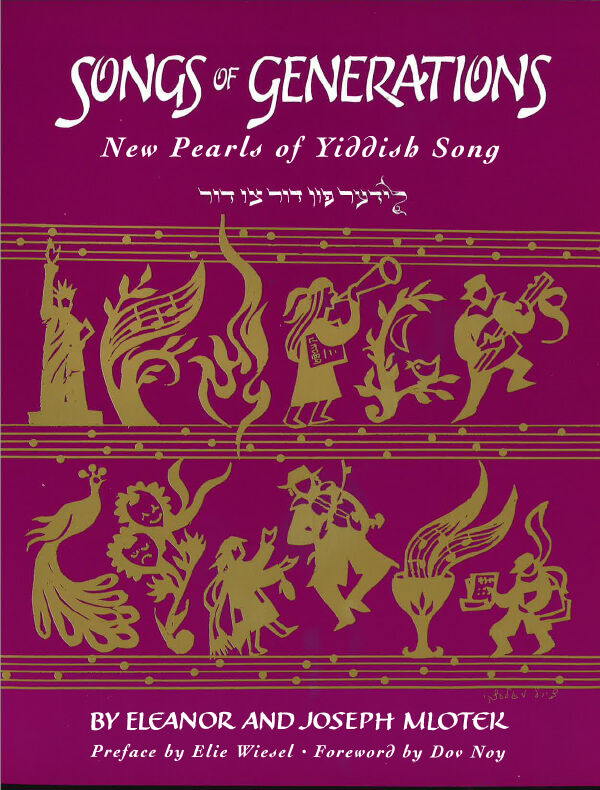One of the “Farbotene lider” (Forbidden Songs) which were sung clandestinely in Soviet Russia in the 1960s. Transcribed by the compilers from a recording by David Eshet, Israel.

Winter, how deep the snow and dense the frost.
I am, after all, free but I feel like a slave.
I don’t want to be your non-paying guest anymore,
I thank you for all the days and nights.
Don’t ask why a swallow doesn’t want his nest,
And looks for some kind of home far away.
Thanks for not forgetting who I’m descended from.
Excuse me, I tell the truth fearlessly.
I know you all stand around and laugh,
And think that my ideas are simply sinful.
Over there, Israel shines gloriously for me,
And calls me: come home, you are my child.
Believe me, I am no longer what I was,
And my brothers no longer allow themselves to be slaughtered.
I want to see my land while I am still alive.
Excuse me — that is my desire today.
One Babi Yar was enough,
I’d almost forgotten those black days.
Remind me, and I thank you very much for that.
I know very well where my long road leads to.
Vinter, vi tif der shney un shtark der frost,
lkh bin dokh oyf der fray un fil mikh vi a knekht.
lkh vii shoyn mer nit zayn bay aykh oyf kest,
lkh dank aykh far di ale teg un nekht.
Nit fregt far vos a shvalb vii nit zayn nest,
Un zukht a shtikl heym dort in a vaytn hek.
A dank vos ir mayn opshtam nisht fargest,
Antshuldikt, ikh zog dem emes on shum shrek.
lkh veys ir ale shteyt arum un lakht
Un trakht az mayn gedank iz nor a zind,
Dort shaynt far mir yisroel mit prakht,
Un ruft mikh: kum aheym, du bist mayn kind.
Gleybt mir, ikh bin nit mer vos kh’bin geven,
Un mayne brider lozn zikh nisht shekhtn mer.
lkh vii nokh bay mayn lebn mayn land derzen,
Antshuldikt mir — dos iz mayn bager.
Genug geven shoyn eyn mol babi-yar,
lkh hob kemat fargesn yene shvartse teg,
Dermont mikh un ikh dank aykh zeyer derfar,
lkh veys shoyn gut vu s’firt mayn lange veg.
װינטער, װי טיף דער שנײ און שטאַרק דער פֿראָסט,
איך בין דאָך אױף דער פֿרײַ און פֿיל מיך װי אָ קנעכט.
איך װיל שױן מער ניט זײַן בײַ אײַך אױף קעסט.
איך דאַנק אײַך פֿאַר די אַלע טעג און נעכט.
ניט פֿרעגט פֿאַר װאָס אַ שװאַלב װיל ניט זײַן נעסט,
און זוכט אַ שטיקל הײם דאָרט אין אַ װײַטן העק.
אַ דאַנק װאָס איר מײַן אָפּשטאַם נישט פֿאַרגעסט.
אַנטשולדיקט, איך זאָג דעם אמת אָן שום שרעק.
איך װײס איר אַלע שטײט אַרום און לאַכט
און טראַכט אַז מײַן געדאַנק איז נאָר אַ זינד.
דאָרט שײַנט פֿאַר מיר ישׂראל מיט פּראַכט.
און רופֿט מיך: קום אַהײם, דו ביסט מײַן קינד.
גלײבט מיר, איך בין ניט מער װאָס כ׳בין געװען,
און מײַנע ברידער לאָזן זיך נישט שעכטן מער,
איך װיל נאָך בײַ מײַן לעבן מײַן לאַנד דערזען.
אַנטשולדיקט מיר — דאָס איז מײַן באַגער.
גענוג געװען שױן אײן מאָל באַבי־יאַר,
איך האָב כּמעט פֿאַרגעסן יענע שװאַרצע טעג.
דערמאָנט מיך און איך דאַנק אײַך זײער דערפֿאַר.
איך װײס שױן גוט װוּ ס׳פֿירט מײַן לאַנגע װעג.
Song Title: Antshuldikt!

The Songs of Generations: New Pearls of Yiddish Song anthology comprises songs that were either never printed before or appeared in rare and inaccessible publications — sometimes in different versions and without proper sources. Most of the songs in this book were submitted by readers of Chana and Yosl’s column “Perl fun der yidisher poezye” (Pearls of Yiddish Poetry) in the Yiddish newspaper Der Forverts (The Forward), initiated in October, 1970. Over 25 years, thousands of songs were collected in correspondence and on cassettes from readers throughout the world, and they represent a veritable national Yiddish song archive. Chana Mlotek, in her introduction, writes, “In the course of years the inquiries, contributions and enthusiasm of these readers have kept our own interest unflagging and have reinforced our dedication to this effort. And in recent years our participants have also been augmented by new readers from the former Soviet Russia, who receive our newspaper there or from newly-arrived immigrants in this country and Israel.”